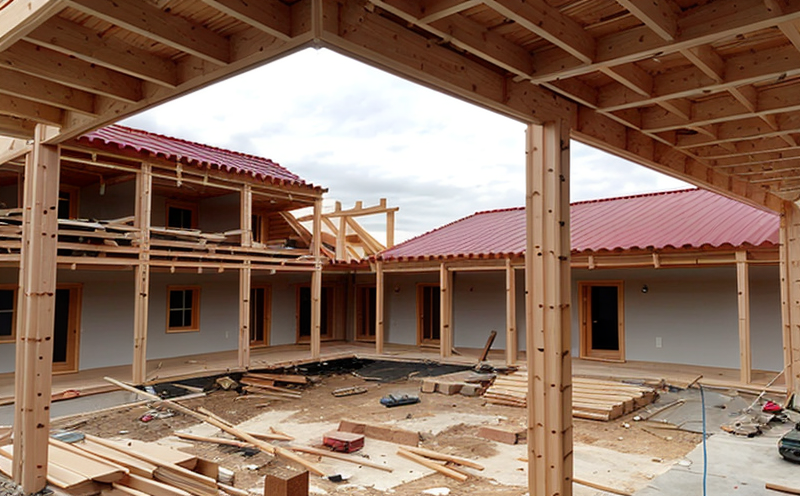Verifying that the strength of materials used in construction meets building code requirements for structural safety
Ensuring Structural Safety The Importance of Verifying Material Strength in Construction
The construction industry is a multi-billion-dollar market that requires precision, expertise, and adherence to strict regulations. One crucial aspect of building design and construction is ensuring the structural safety of buildings through verifying the strength of materials used in construction. This laboratory service, offered by Eurolab, plays a vital role in guaranteeing that structures can withstand various loads and stresses without compromising the safety of occupants.
What is Verifying Material Strength?
Verifying material strength involves testing and evaluating the properties of building materials to determine their ability to resist deformation, cracking, and failure under different loading conditions. This process ensures that materials meet or exceed the minimum requirements specified in local building codes and standards. Eurolabs experts use state-of-the-art equipment and techniques to conduct a range of tests, including compressive strength, tensile strength, flexural strength, and impact resistance.
Why is Verifying Material Strength Essential?
Using materials that do not meet structural safety standards can lead to costly repairs, extensive downtime, and even catastrophic failures. In the worst-case scenario, such incidents can result in loss of life and damage to property. By verifying material strength through laboratory testing, businesses can
Ensure Compliance with Building Codes Adherence to local building codes is mandatory for construction projects. Eurolabs laboratory service helps ensure that materials meet or exceed these requirements.
Minimize the Risk of Structural Failures Verifying material strength reduces the likelihood of catastrophic failures, saving lives and minimizing damage to property.
Reduce Construction Costs Identifying and addressing material issues before construction begins can save costs associated with repairs, replacements, and downtime.
Enhance Credibility and Reputation Demonstrating a commitment to structural safety through rigorous testing and verification helps businesses build trust with clients, architects, engineers, and regulatory authorities.
Key Benefits of Eurolabs Laboratory Service
Our laboratory service offers numerous benefits to construction companies, including
Comprehensive Testing We conduct a wide range of tests to evaluate the strength and durability of various materials.
Expert Analysis Our experienced technicians provide in-depth analysis and reporting on test results, enabling informed decision-making.
Timely Results Fast turnaround times ensure that project schedules are not compromised.
Cost-Effective Solutions Identifying material issues early on helps reduce construction costs and avoid costly repairs or replacements.
Reduced Risk of Liability Verifying material strength minimizes the risk of structural failures, saving businesses from potential lawsuits and financial losses.
Frequently Asked Questions
Q What types of materials can be tested for strength?
A We test a wide range of building materials, including concrete, steel, masonry, wood, and composites.
Q How long does it take to receive results?
A Our fast turnaround times ensure that project schedules are not compromised. Results typically take 3-5 business days or less.
Q Do you provide certification for compliance with building codes?
A Yes, our laboratory service includes certification for compliance with local building codes and standards.
Q Can I request specific testing parameters?
A Absolutely! Our experienced technicians work closely with clients to determine the most relevant tests and parameters for their project.
Q What kind of support do you offer during the testing process?
A Our dedicated team provides expert guidance throughout the testing process, ensuring that results meet or exceed client expectations.
Conclusion
Verifying material strength through Eurolabs laboratory service is a critical component of construction projects. By ensuring compliance with building codes and standards, businesses can minimize the risk of structural failures, reduce construction costs, and enhance their reputation in the industry. With our comprehensive testing, expert analysis, timely results, cost-effective solutions, and reduced liability risks, Eurolab is your trusted partner for verifying material strength.
-
Testing the ability of materials to resist crushing forces or compression without failing
-
Evaluating the stress at which materials like concrete, steel, and composites begin to deform or fail
-
Simulating extreme weight and pressure scenarios to assess material resilience under compressive stress
-
Testing the maximum load that materials can support before reaching their compressive failure point
-
Ensuring that materials used in foundations and structural elements maintain their integrity under load
-
Verifying the compressive strength of concrete and other masonry materials used in construction
-
Ensuring that composite materials can handle compressive forces without significant damage
-
Testing the compressive properties of materials used in high-load environments, such as bridges and skyscrapers
-
Evaluating how materials perform under vertical load conditions, such as the weight of buildings and structures
-
Simulating pressure conditions to ensure materials will not collapse or buckle under heavy loads
-
Testing the ability of materials to maintain their shape and strength under constant pressure over time
-
Simulating the effect of thermal expansion and contraction on materials' compressive strength
-
Testing materials for their ability to withstand pressure during the freeze-thaw cycles in construction
-
Ensuring that materials like steel and aluminum maintain their integrity under compressive forces during manufacturing
-
Testing materials for their compressive strength in both dry and wet conditions to ensure performance consistency
-
Verifying that materials used for columns, beams, and load-bearing elements provide sufficient strength
-
Ensuring the longevity of materials under constant or cyclic compressive loads over time
-
Testing the resistance of materials to crushing forces when subjected to extreme weight distribution
-
Evaluating the effect of high-temperature exposure on the compressive strength of building materials
-
Testing the compressive strength of materials used in flooring and wall systems to ensure safety
-
Ensuring that compressive stress does not cause cracking, warping, or other structural issues
-
Testing how well materials perform in confined spaces, such as tunnels or enclosed structures, under compression




